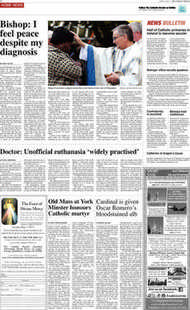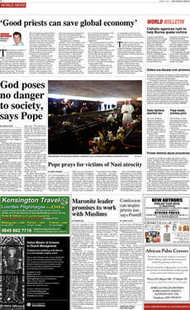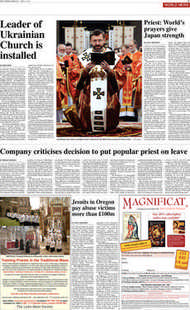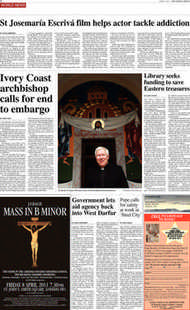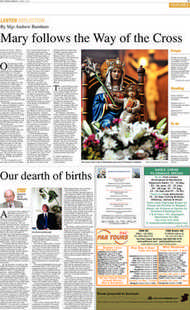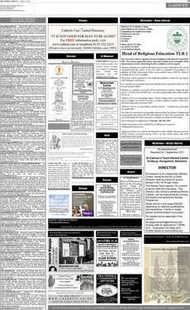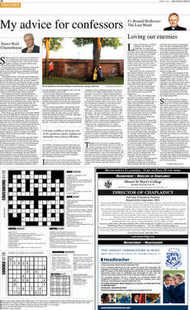Page 16, 1st April 2011
Page 16

Report an error
Noticed an error on this page?If you've noticed an error in this article please click here to report it.
Tags
Share
Related articles
THE WORD THIS WEEK
By Bishop David McGough
Fourth Sunday of Lent 1 Sm 16:1, 6-7 & 10-13; Eph 5:8-14; Jn 9:1-41 ‘Fill your horn with oil and go. I am sending you to Jesse in Bethlehem, for I have chosen myself a king among his sons.” With these words the prophet Samuel was dispatched to identify and anoint Israel’s king. The search for Israel’s future king among Jesse’s sons contrasted human and divine perception. Samuel was confident that the king would be found among Jesse’s oldest and strongest sons. He was led in a different direction, to David the youngest son, a mere shepherd in the field. The anointing of David emphasised a different way of seeing and understanding. Samuel was instructed to take no notice of height or appearance, “for God does not see as man sees; man looks at appearances but God looks at the heart”.
During Lent we are invited to look beyond the superficial, to see as God sees. Paul’s Letter to the Ephesians described such insight through the imagery of light and darkness. “You were darkness once, but now you are light in the Lord.” Christ alone is the light that brings sharp focus to our lives. Repentance is the process in which we surrender ourselves to the scrutiny of Christ’s light, knowing that in him even our greatest darkness is transformed into light. “Wake up from your sleep, rise from the dead, and Christ will shine on you.” Throughout Lent let us acknowledge the darkness of sin that blights our lives, that blinds our eyes to the truth about ourselves. We shall begin our Easter celebrations with the blessing of the new fire and procession of the paschal candle, welcoming Christ as the Light of the world. That proces sion is already begun in us as we turn to Christ, as we become children of the light.
From the earliest times John’s account of the man born blind was used as an instruction for those preparing for baptism at Easter. We stand alongside the blind man in our longing for a light that illuminates mind and heart. There is a darkness that has the power to overwhelm the will for goodness, the inner light that gives meaning and purpose to our lives. Confronted with such darkness Christ claimed to be that light. “As long as I am in the world I am the light of the world.” Jesus took pity on the blind man, restoring his sight through anointing and washing in the waters of Siloam. Christ has broken through the barriers of our darkness in the waters of baptism and our anointing in the Holy Spirit. We are not the helpless captives of our own darkness, whatever that darkness might be. Christ welcomed the blind man as one in whom the work of God might be displayed. He welcomes us as sinners, for it is in us that the work of God is achieved, in us that his light shines forth.
The dispute with the Pharisees that followed the healing of the blind man revolved around a single question: where did Jesus come from? The Pharisees could not bring themselves to believe that Jesus came from God. The blind man, touched by the grace of God, clearly saw and confessed that Jesus came from the Father. “The man said: ‘Lord, I believe’, and worshipped him.” It is in the humble submission of prayer that we begin to see, that we understand that Christ has come from the Father and is leading us to the Father.
blog comments powered by Disqus



